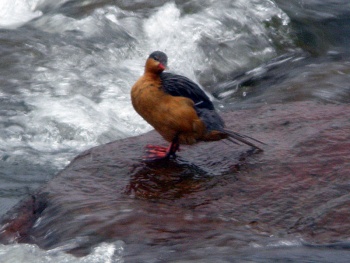
Male right, female left, subspecies leucogenis
Photo by Steve Sanchez
Aguas Calientes, Machu Picchu, Cusco, Peru, November 2014
Photo by Steve Sanchez
Aguas Calientes, Machu Picchu, Cusco, Peru, November 2014
- Merganetta armata
Identification
40–46 cm (15¾-18 in)
Small streamlined duck with rubbery red bill and long stiff tail.
Male
- White head and neck white
- Black crown and stripe down hindneck
- Black line from eye down side of neck
- Rest of upperparts blackish more or less streaked tawny and gray
- White underparts lightly streaked gray
- Green wing speculum bordered white (hard to see).
Female very different
- Bluish-gray crown and hindneck
- Rest of upperparts like male
- Sides of head and entire underparts orange cinnamon.
Distribution
South America: found in Colombia, Venezuela, Ecuador, Peru, Bolivia, Chile, Argentina and Tierra del Fuego.
Taxonomy
Subspecies
There are 6 subspecies[1]:
- M. a. colombiana:
- M. a. leucogenis:
- Andes of central and southern Ecuador and Peru
- M. a. turneri:
- Andes of southern Peru (Cuzco and Arequipa)
- M. a. garleppi:
- Andes of Bolivia
- M. a. berlepschi:
- M. a. armata:
- Andes of Chile and adjacent Argentina south to Tierra del Fuego
An additional subspecies fraenata is generally considered invalid[2].
Habitat
Fast flowing mountain rivers. Observed at heights of 8700 ft.
Behaviour
Breeding
It nests in waterside caves.
Diet

Female with 2 ducklings, subspecies colombiana
Photo by JWN Andrewes
Quipucuna, Pichincha, Ecuador, 1989
Photo by JWN Andrewes
Quipucuna, Pichincha, Ecuador, 1989
Their diet consists almost entirely of aquatic invertebrates, particularly insect larvae and molluscs. They may also take some fish.
References
- Clements, J. F., T. S. Schulenberg, M. J. Iliff, D. Roberson, T. A. Fredericks, B. L. Sullivan, and C. L. Wood. 2017. The eBird/Clements checklist of birds of the world: v2017, with updates to August 2017. Downloaded from http://www.birds.cornell.edu/clementschecklist/download/
- Avibase
- Handbook of the Birds of the World Alive (retrieved Apr 2018)
- BF Member observations
Recommended Citation
- BirdForum Opus contributors. (2024) Torrent Duck. In: BirdForum, the forum for wild birds and birding. Retrieved 14 May 2024 from https://www.birdforum.net/opus/Torrent_Duck






